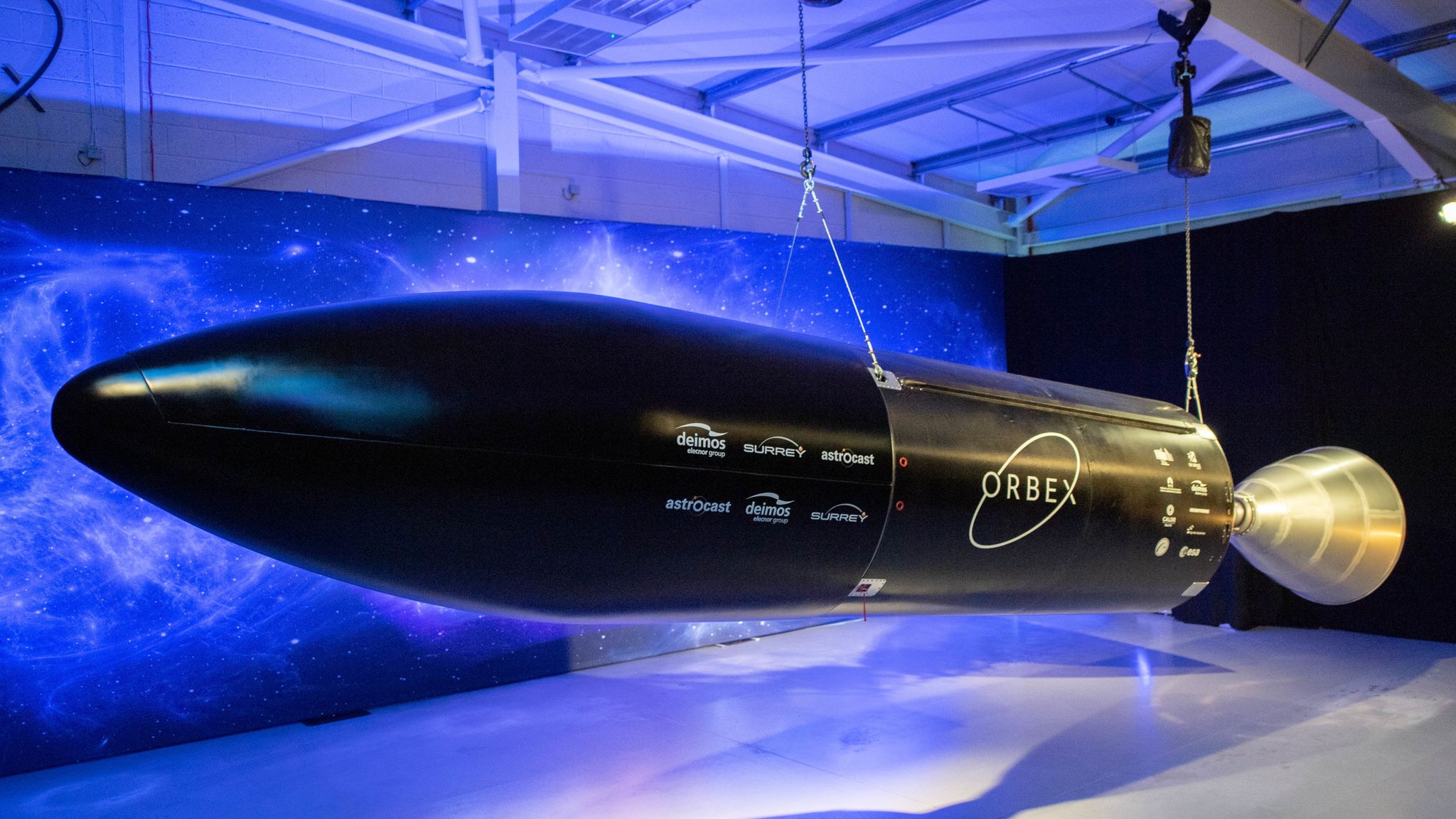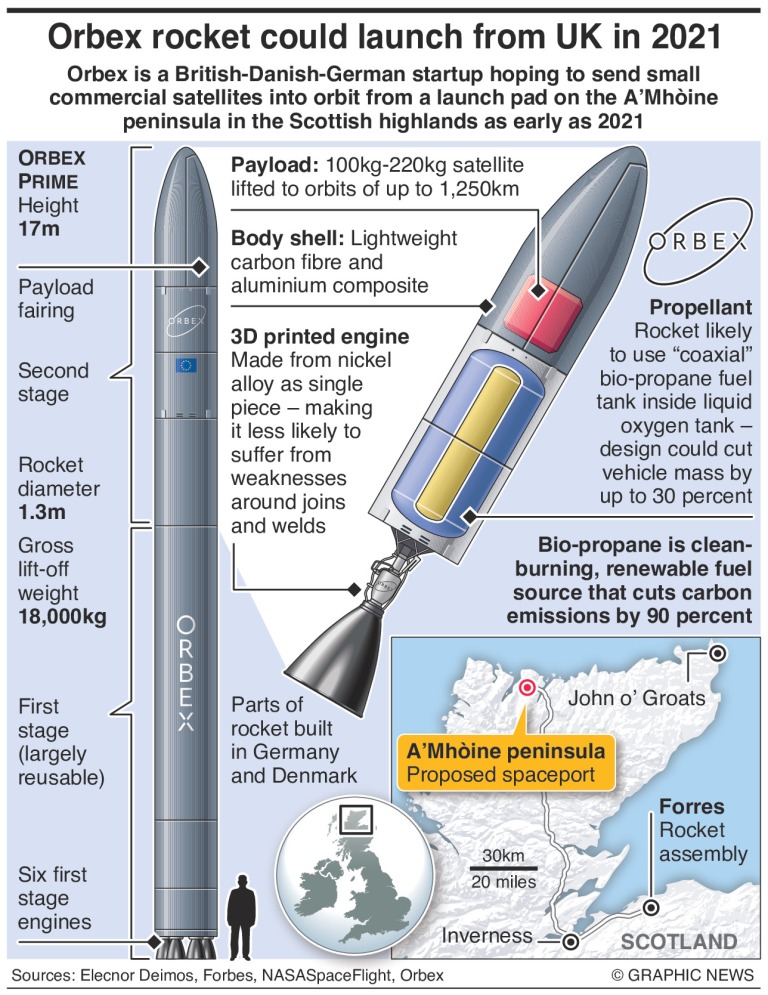Orbex biofuel space rocket
Exciting news from British scientists about Orbex and their Prime space rocket, which will have a 96% lower carbon footprint than similar space programs on traditional fuel. This was possible through the use of bioLPG.
Orbex Prime features
First, it is the world’s largest 3D Printed Rocket Engine. Unveiled publicly in early 2019, their 3D printed rocket engine is uniquely manufactured in a single piece without joining in partnership with additive manufacturer SLM Solutions. Given the extreme temperature and pressure fluctuations involved in space flight, this gives the engine an advantage over other rocket engines, which can suffer from weaknesses associated with joining and welding.
The custom-made, large volume 3D printer will allow Orbex to print more than 35 large-scale rocket engine and main stage turbopump systems annually, as the company scales up its production capabilities for launches.

It is also the first commercial rocket engine designed to work with bio-propane, a clean-burning, a renewable fuel source that cuts carbon emissions by 90% compared to fossil hydrocarbon fuels, supplied by Orbex’s new exclusive BioLPG fuel partner Calor.
Prime is poised to become the first in a new generation of ultra-green launch systems, benefiting from the use of renewable, ultra-low-carbon biofuel.
Important that it is also designed to be reusable and will not leave any debris on Earth, in the Earth´s oceans, or in the Earth’s atmosphere.
Orbex is also committing to offsetting all emissions from the rocket and its launch operations, ensuring every launch is carbon neutral. Orbex plans to launch Prime from Space Hub Sutherland, the carbon-neutral Spaceport in the North of Scotland.
Study
The new study by the University of Exeter calculated that a single Orbex Prime launch would produce up to 86 per cent less emissions than a similar-sized vertical launch vehicle powered by fossil fuels. This gulf in emissions is primarily due to the similar-sized vehicle emitting high levels of black carbon, the particulate matter formed by the incomplete combustion of fuels containing carbon – and a major contributor to climate change when emitted from rocket engines into the stratosphere.
The study also compared the carbon footprint of launching Prime with that of a rocket that is horizontally launched from a carrier aircraft. In this comparison, the direct launch emissions required by Prime was as much as 96 per cent lower than the horizontally launched vehicle.
According to the study by the University of Exeter, a single launch of the Orbex Prime rocket would result in total emissions of 13.8 tonnes of CO2e. This includes the direct emissions from the launch, the indirect emissions created from the production of the propellent fuels required (biopropane and liquid oxygen), and the radiative forcing (RF) effects of non-CO2 emissions at high altitude. This carbon footprint is comparable to the average emissions created by one single person in the UK each year.
Orbital space launches using fossil fuels create enormous amounts of black carbon in the upper atmosphere. Annually the amount created by around 120 space launches is equivalent to the black carbon emissions from the entire global aviation industry.

Why BioLPG?
BioLPG, also called biopropane and renewable propane, is produced as a by-product from the renewable diesel (HVO) production process. BioLPG is chemically identical to LPG, but with a lower carbon footprint, meaning it can function as a drop-in fuel.
The BioLPG used by Orbex for Prime is sourced from Calor, the UK’s leading BioLPG supplier, that produces the propane as a by-product from the waste and residual material from renewable diesel production. As a result, the Greenhouse Gas (GHG) factor[iv] for BioLPG is 90 per cent lower than a fossil-based fuel such as RP-1, the highly-refined form of Kerosene typically used as rocket fuel.
The Orbex Backstory
The COVID-19 pandemic did not slow Orbex down one bit. In fact, in March, Orbex won the largest ever award from The European Space Agency (ESA)’s Boost! Commercial Space Transportation Services and Support (C-STS) programme, designed to support commercially sustainable space transportation services in Europe.
The Boost! contract was awarded to Orbex following an in-depth evaluation process, assessing Orbex’s commercial strategy, financial stability, and technical progress. This is the largest award made to date by the programme. Orbex will supplement the funding with an additional €4.7 million in matching private investment.
Also, Orbex was the 1st UK space-sector company to win prestigious Horizon 2020 funding – an impressive $24 million in a funding round led by BGF, the UK’s most active investment company, and Octopus Ventures, one of the largest VCs in Europe. The new investments secure the roadmap to the first launch from the Space Hub Sutherland spaceport in Scotland.
Source: Article “Sky rockets in flight, biofuels delight! The bioLPG story, Orbex’s biofuel powered space rocket and more“, Biofuels Digest.


